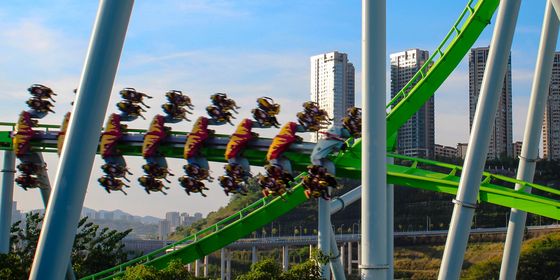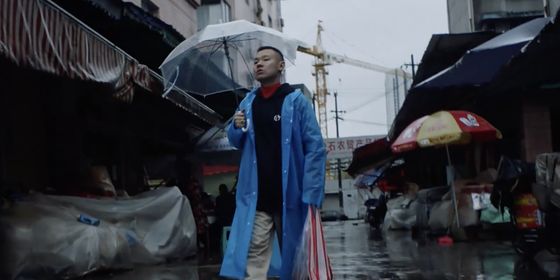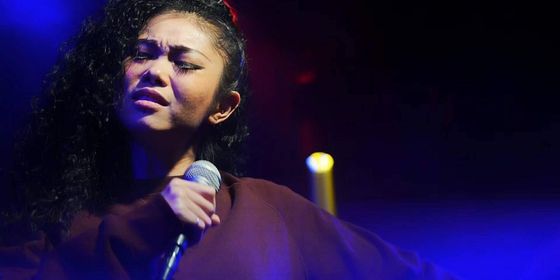The modernization of state media content blurs the line between entertainment and publicity
“There is in fact no such thing as art for art’s sake…art that is detached from or independent of politics,” said Chairman Mao at the Yan’an Forum on Literature and Art in 1942.
Yet while socialist realism is no longer the order of the day in Chinese arts, mainstream television, music, and commercial entertainment are by no means easy to distinguish from art for political purposes—and one foreign rapper recently became the unintended casualty of state media’s content modernization.
“Another Day in China,” a “lighthearted” music video about being a foreigner in Beijing, was filmed in December by The Foreigners Research Institute, a social media content-creation startup. Originally published on The Foreigners’ Weibo page, the video was reposted by Xinhua two days later on their YouTube channel, and the backlash began.
Dylan Jaye, the writer-rapper and star of the video, tells TWOC that he started with purely non-political intentions. The Foreigners have no known ties with the Chinese government, and was started by, and largely employs, immigrants to China. Nevertheless, a CNN journalist tweeted that “Xinhua’s” video “showcased fawning foreigners stunned by all things China,” and YouTube comments derided it as “embarrassingly garbage propaganda produced by the CCP.” It was an ironic outcome for a project that Jaye calls “a small, small way to fight” negative stereotypes against China.
Nevertheless, it’s not entirely unexpected. Aside from Xinhua slapping their own logo on the video (just underneath where The Foreigners put theirs), recent practices in state media make fuzzy the origins and intentions of “Another Day In China.” Last September, at a symposium on culture, President Xi Jinping called for the country’s artists and writers to “promote the Chinese spirits, strengthen the people’s faith, and provide strong spiritual power for… realizing the Chinese dream of national rejuvenation.”
Vox, on the other hand, observed that “the government is trying to be relevant among millennials.” Whatever the intention, a rash of “creative” state-sponsored media products have appeared in recent years, including an MV created by the Communist Youth League for the boy-band TF Boys, which viewers cheekily dubbed “popaganda.” Patriotic films like Wolf Warrior 2 have gotten equally polarized reviews as Jaye’s video from Chinese and Western viewers, and a type of Chinese hip hop has been steadily gaining in visibility if not popularity: raps about state policy.
These state rap videos started around two years ago, one of the first being an animated rap released at the end of 2015 about China’s state reforms. Prior to that video, called “The Leading Group for Comprehensive Reform is Two Years Old,” another song and a couple of other animated videos had been produced by the state-backed Fuxing Lushan Studio.
Some of these videos are in English, and a few feature animated foreign singers. Real foreigners, though, have also increasingly become a part of both state and non-state promotional media. One classic was a one-minute clip to promote overseas Chinese infrastructure, featuring Erik Nilsson, an American journalist at China Daily, telling his daughter bedtime stories about the Belt and Road Initiative.
The response to these videos by Western media has been less than warm, with words like “cheesy” and “bizarre” appearing in English articles and on Western social media platforms. The domestic reaction to this media is harder to gauge given tight government restrictions on online commenters. However, when Jaye’s video was first published by The Foreigners, it earned 3,000 comments on Weibo, almost all positive. The start-up’s Weibo page has over two million followers and their original videos regularly get comments in the thousands and forwards in the 10,000s.
Jaye claims his music video “was made from genuine experiences,” and any similarities with propaganda are purely coincidental. “The Chinese government has its views and objectives, and then, I have my views,” he says. “This video was an area where we overlapped.” In his view, a lot of hip hop in China is centered on trap music, a style emerging from the US in the late 1990s, known for its heavy use of bass and 808 drums. One goal in shooting “Another Day In China” was to help introduce a style of hip hop that, Jaye says, “sit[s] outside that.”
But intentionally or not, the video ticked many boxes of Party-approved messages, and Xinhua was ready to jump on board. According to Jaye, the goal of “Another Day in China” was to use art to inspire a more comprehensive Western understanding of China. Like Xi’s ideal of realizing what China Daily calls a “change [in] the global landscape, which was shaped by Western countries,” Jaye’s video lent itself to promoting a more positive image of China abroad. There is even a point where it gets explicitly political.
“I’ve been thinking, after Donald Trump and Brexit and the chaos and the mayhem, I’ll sit here and sip oolong,” Jaye raps. Jaye denies that these lyrics are any kind of political messaging. “It’s not saying ‘The West is a mess.’ It’s not saying ‘I don’t like The West. I like China,’” he explains. “The West has its issues too…I’m not trying to make a strong political commentary.”
Jaye’s experience with Western critics’ sensitivity to any seemingly politicized material from China is not a new one. In 1999, Chinese director Zhang Yimou withdrew his film Not One Less from the Cannes International Film Festival, where several of his previous films have won awards, out of frustration at critics’ claims that the film was pro-China propaganda.
In an open letter to the festival organizers, Zhang wrote, “In regard to Chinese films, the West has for a long time seemed to have only had a ‘politicized’ method of interpretation: If it’s not categorized as an ‘anti-government’ type, it’s just categorized as ‘pro-government propaganda.’”
Jaye recognizes a similar bias in the response to his own work.
“There are a lot of people, as soon as you say China, the first thing they’ll think of is internet censorship, violation of human rights, and authoritarian government…but I think that’s missing the point of what this country is,” Jaye explains. “If someone made something like [this video] about Japan, that [response] wouldn’t happen, just because the Western view of Japan and the Western view of China are different.”
By evolving tactics from model ballets to mixed beats, from biaoyu slogans to beat-box, government messaging in the millennial age tries to turn propaganda into art—with the result that art looks like propaganda. The fallout can be brutal for artists caught in the crossfire, but, as Mao also said, revolution—the changing of prevailing norms and perceptions—was never meant to be easy.
Hip Hop-aganda? is a story from our issue, “The Noughty Nineties.” To read the entire issue, become a subscriber and receive the full magazine.












